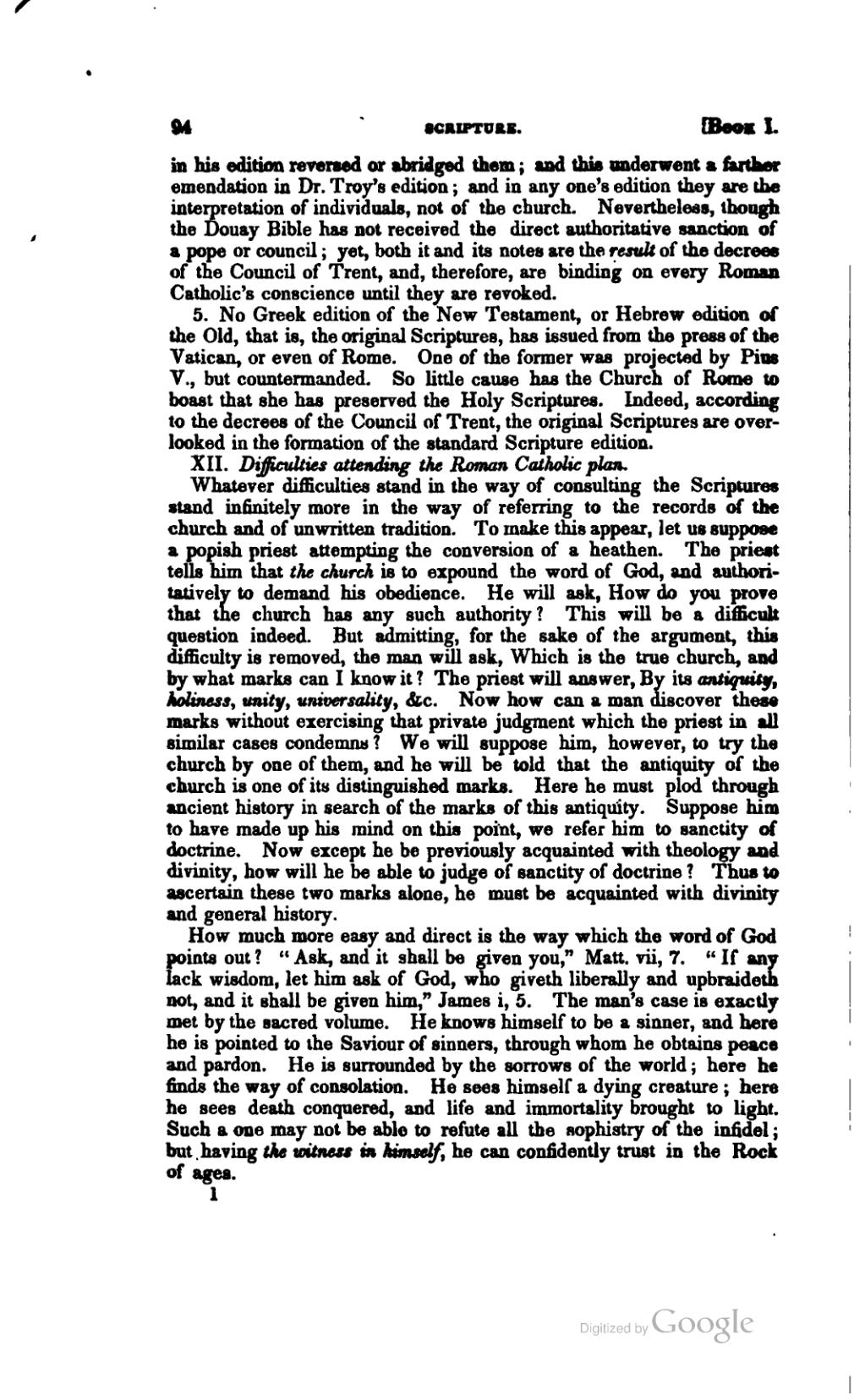04 ' .eton, Tums. [Boot 1. in his edition reversed or ubi'idged them; mad this underwent m ?arther emendation in Dr. Troy'*s edition; and in any one'8 edition they are the interpretation of individuals, not of the church. ?Tevertheleas, though the Doumy Bible has not received the direct authoritative unction of' a pope or council; yet, both it and its notes are the reJtdt of the decrees of the Council of Trent, and, therefore, are binding on every Roman Catholic's conscience until they are revoked. 5. No Greek edition of the New Testament, or Hebrew edition o/ the Old, that is, the original Scriptures, has issued from the press of the Vatican, or even of Rome. One of the former was projected by Pius V., but countermanded. So little cause has the Church of Rome to bout that she has preserved the Holy Scriptures. Indeed, according to the decrees of the Council of Trent, the original Scriptures are over- looked in the formation of the standard Scripture edition. XII. D/.p?z?/? att?,u/?g t/? Roma? Ca?/?/? ?m? Wha?ver a?mculdes stand in the w?y of consulting the $cripuws, stand infinitely more in the way of referring to the records of the church and of unwritten tradition. To make this appear, let us suppose a popish priest attempting the conversion of a heathen. The priest tells him that tAz cAurc. A is to expound the word of God, and authori- tatively to demand his obedience. He will ask, How bdoe you prove that the church has any such authority ? This will & dit?uh question indeed. But admitting, for the sake of the argument, this difficulty is removed, the rain will ask, Which is the true church, and by what marks can I know it ? The priest will answer, By its Ao//mtss, ?m/ty, ug/ver?'a//ty, &?c. Now how can a man discover thes? marks without exercising that private judgment which the priest in all similar cases condemns ? We will suppose him, however, to try the church by one of them, and he will be told that the antiquity of the church is one of its distinguished marks. Here he must plod through ancient history in search of the marks of this antiquity. Suppose him to have made up his mind on this poi?nt, we refer him to sanctity of doctrine. Now except he be previously acquainted with theology divinity, how will he be able to judge of sanctity of doctrine ? Thus to ascertain these two marks alone, he must be acquainted with divinity and general history. How much more easy and direct is the way which the word of Cod ?c?ts out? "Ask, and it shall be given you,"Matt. vii, 7. "If any wisdom, let him ask of ?d, who giveth liberally and upbraideth not, and it shall be given hhn," James i, 5. The man's case is exactly met by the sacred volume. He knows himself to be a sinner, and hero he is pointed to the Saviour of sinners, through whom he obtains peacs and pardon. He is surrounded by the sorrows of the world; here h? finds the way of consolation. He sees himself a dying creature; here he sees death conquered, and life and immortality brought to light. Such a one may not be able to refute all the sophistry of the infidel; but.having 01? ?t?u? ?/8m?f, he can confidently trust in the Rock of ages. 1 oigitizeo by Goodie
�
